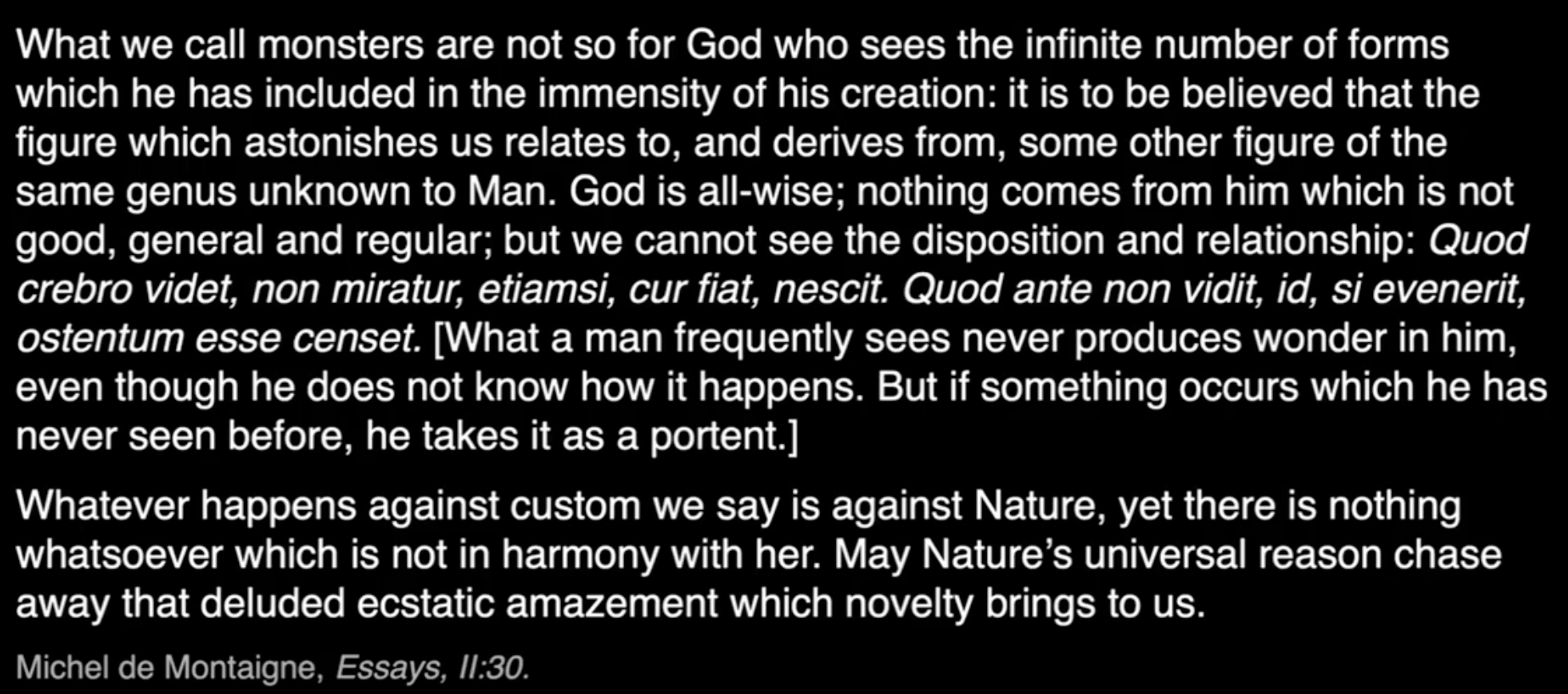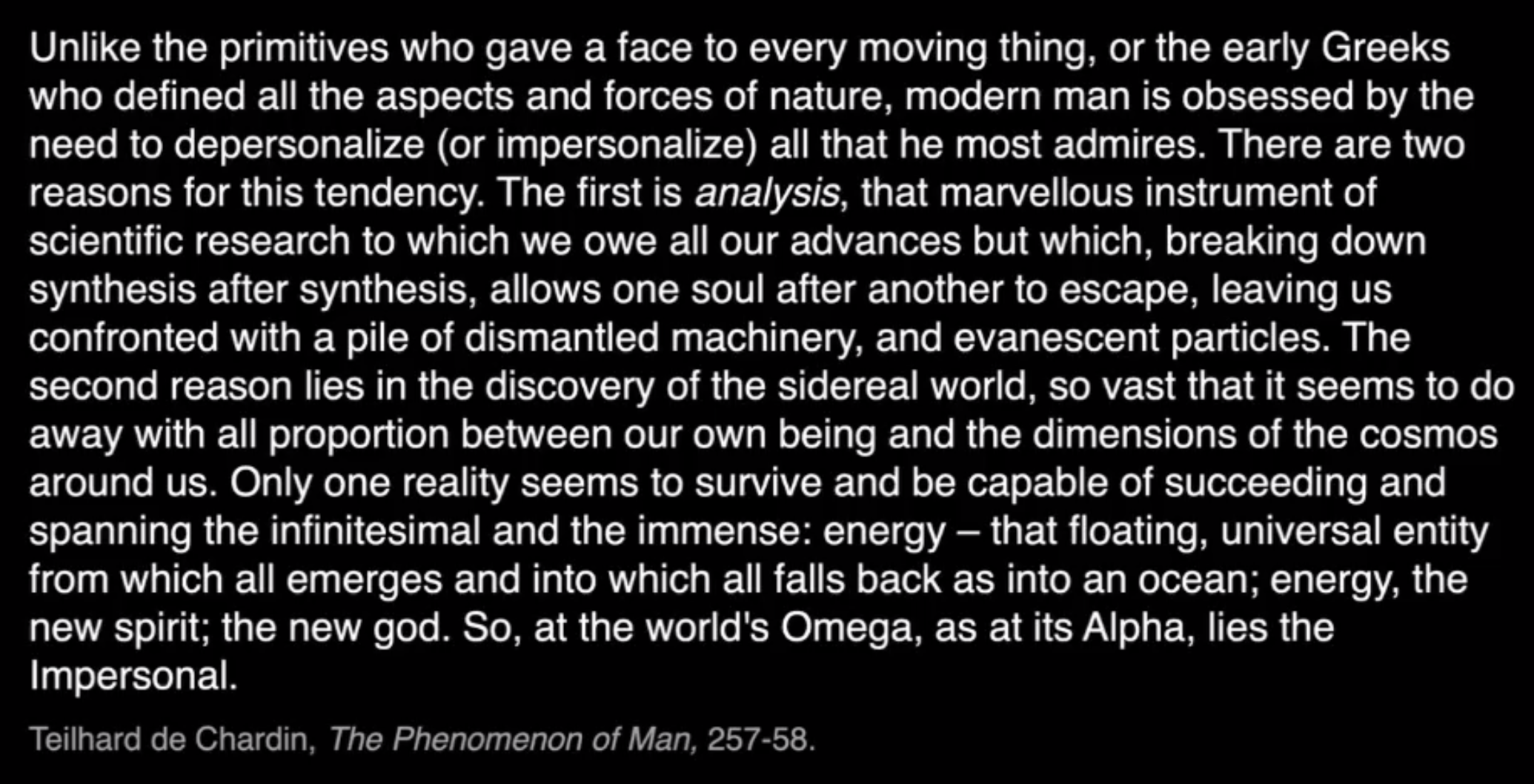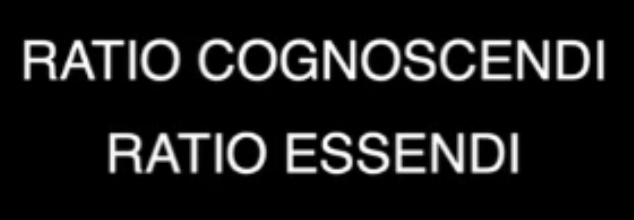Weird Studies/Courses/Beauty & Horror
25 Jun 2024 - 19 Apr 2025
Week 1
- The idea of the holy : an inquiry into the non-rational factor in the idea of the divine and its relation to the rational
- tl;dr this seems like a very well-written attempt at describing the characteristics of religious experience. a very mapped-out tour of the ineffable. obviously such a work is doomed to failure, but props for trying I guess?
Before I ventured upon this field of inquiry I spent many years of study upon the rational aspect of that supreme Reality we call God , and the results of my work are contained in my books, Naturalietische und religiose Weltansicht (Eng. Tr. Naturalism and Religion , London, 1907), and Die Kant-friesisclie Religions-Philosophie. And I feel that noone ought to concern himself with the 'Numen ineffabile' who has not already devoted assiduous and serious study to the 'Ratio aeterna'.
- .
- Hm not sure what I will get out of this, its not like I have a great devotion to rational religion
- Makes me think of Taussig's Defacement because I am a smartass. Also No holiness, vastness!
What is maintained in this book is, in fact, that religion is something not only natural but also, in the strict sense of the word, paradoxical. It is a real knowledge of, and real personal communion with, a Being whose nature is yet above knowledge and transcends personality.
We generally take holy as meaning completely good ; it is the absolute moral attribute, denoting the consummation of moral goodness
- Wait what? That is not my definition of holy. OK I guess the book is arguing for something beyond that as well.
It will be our endeavour to suggest this unnamed Something to the reader as far as we may, so that he may himself feel it. There is no religion in which it does not live as the real innermost core, and without it no religion would be worthy of the name. It is pre-eminently a living force in the Semitic religions, and of these again in none has it such vigour as in that of the Bible. Here, too, it has a name of its own, viz. the Hebrew קדוש, to which the Greek ayios and the Latin sanctus, and, more accurately still, sacer, are the corresponding terms.
- OK he wants to disentangle holiness from goodness and proposes "numinous" to indicate a certain state of mind. OK.
- The first aspect he describes about this is abasement:
There you have a self-confessed feeling of dependence , which is yet at the same time far more than, and something other than, merely a feeling of dependence. Desiring to give it a name of its own, I propose to call it creature-consciousness or creature-feeling. It is the emotion of a creature, abased and overwhelmed by its own nothingness in contrast to that which is supreme above all creatures.
- Reminds me of 2006-06-01-joke-54-thinks he's nothing via Omniorthogonal: Death, thou shalt die . Also of course
- mysterium tremendum – something like "holy dread"
Religious dread (or awe ) would perhaps be a better designation. Its antecedent stage is daemonic dread (cf. the horror of Pan) with its queer perversion, a sort of abortive off-shoot, the dread of ghosts . It first begins to stir in the feeling of something uncanny , eerie , or weird . It is this feeling which, emerging in the mind of primeval man, forms the starting-point for the entire religious development in history.
And all ostensible explanations of the origin of religion in terms of animism or magic or folk psychology are doomed from the outset to wander astray and miss the real goal of their inquiry, unless they recognize this fact of our nature primary, unique, underivable from anything else to be the basic factor and the basic impulse underlying the entire process of religious evolution.
- Hm.
- Turns to the wrathful aspects of God
In the first place, it is patent from many passages of the Old Testament that this Wrath has no concern whatever with moral qualities. There is something very baffling in the way in which it is kindled and manifested. It is, ashas been well said, like a hidden force of nature , like stored-up electricity, discharging itself upon any one who comestoonear. It is incalculable and arbitrary . Any one who is accustomed to think of deity only by its rational attributes must see in this "Wrath" mere caprice and wilful passion.
- Personally I have a lot more feelings for god as wrathful than god as moral. The latter seems to have died in Auchwitz.
For one of the chiefest and most general features of Mysticism is just this self-depreciation (so plainly parallel to the case of Abraham) the estimation of the self, of the personal 1 , as something not perfectly or essentially real, or even as mere nullity, a self-depreciation which comes to demand its own fulfilment in practice in rejecting the delusion of selfhood, and so makes for the annihilation of the self.
Whatis really characteristic of this stage is not – as the theory of Animism would have us believe – that men are here concerned with curious entities, called souls or spirits , which happen to be invisible. Representations of spirits and similar conceptions are rather one and all early modes of rationalizing a precedent experience, to which they are subsidiary....They are the source from which springs, not religion, but the rationalization of religion, which often ends by constructing such a massive structure of theory and such a plausible fabric of interpretation, that the mystery is frankly excluded.
- Smartass comment
office hours
- Northrop Frye books on bible mentioned
- pf apologetically reactionay esthetics. Formalism over social realism. I cite Moby Dick
This elusive quality it is, which causes the thought of whiteness, when divorced from more kindly associations, and coupled with any object terrible in itself, to heighten that terror to the furthest bounds. Witness the white bear of the poles, and the white shark of the tropics; what but their smooth, flaky whiteness makes them the transcendent horrors they are? That ghastly whiteness it is which imparts such an abhorrent mildness, even more loathsome than terrific, to the dumb gloating of their aspect. So that not the fierce-fanged tiger in his heraldic coat can so stagger courage as the white-shrouded bear or shark
- Bleary responded with Poe Pym.
- Mentioned Jacob Foster on math
Lecture – Crucifixion
- A paradigmatic image of beauty and horror – but overly familiar.
- PF: mysterium, tremendum, fascinans. Art (beauty) as movement. OK.
- Mozart, Ave Verum Corpus
- Music notation as a mathematics of the soul.
Week 2
- Lecture
- JFM
- Kant / sublime / ineffability
- Art points your mind towards the infinite (paraphrase). I have never had a good theory of art, this is better than nothing. Ligotti, the one redeeming feature of this world is to suggest another.
- Imaginal world vs causal world (yawn)
- Lewis Saase, Madness and Modernism
- poetry ≡ beauty, which becomes a kind of substance to be extracted, and from strange places that are untouched by classical notions of beauty (like symmetry)
- the deeper voice of an artwork (Ligotti)
- Concept of monsters
- they are singular
- something freakish, out of the ordinary, malformed
- god and the singularity of daisies. To God each is complete and unique (bleah). Poets experience the singular (hence monstrous). We each have a monstre inside that lets us access the imaginal (bleah).
- Back to PF: Kundry (Parsifal) as Salome 1.0
- jfm some confusion about big bang
- Duns Scotus: univocity of being (hm should look into that)
- how art is propheic (Eic Wargo book) – acts before the rules are in place
- Reading Lyotard but not making much of it
I shall call modern the art which devotes its "little technical expertise " (so n "petit tecbnique "), as Diderot usd to say, to present the fact that the unrepresentable exists. To make visible that there is something which can be conceived and which can neither be seen nor be visioble: this is what is at stake in modern painting.
- Then something with Kant
Week 3
- Lecture.
- Texas Chainsaw Massacre.
- We are all meat.
- Astrology stuff
- Salome, Tam tam,
Office hours
- The pwage. Inception sound (also found in Dune – both Hans Zimmer)
- Kind of an acoustic brutalism (did they make that connection?). Denotes heavy masses, power.
- JFM: Fairy tale interpretatioin – William Irwin Thompson story of eukaryotic cells?
- Fairy tales as even more basic than myth. One step up from dreams.
- Life doesn't have a meaning, it emerges from the crucible of life (but it is determined sort of )
- Emma Stamm question re Wagner leitmotivs and symbol on van in Texas Chainsaw Massacre but I wasn't listening I admit. Sliding slippery nature of symbols (duh)
- JFM: Something about a dove having to be a dove before a symbol of peace. No real idea what he is talking about. Sounds wrong if anything. Signs are the trivial kind, symbols are the deep kind. I can never keep those straignt
- Synchronicity in the meaning of art (that is, art will have meanings beyond artist intention). Kind of magic, but also kind of simply how things work.
- Dan Haar monsters and banishment of mystery. El\mNelson, this arose with the protestant banisment of miracles.
- What motivated WIlde to write Salome? Story of an impossible love?
- Ah Strauss himself said Salome is NOT supposed to be a sexpot.
- Makes no sense from a solar (external) point of view. Internally though....
- JFM: the trope of femme fatale (death + eroticism)
- Dan Gilbert at 1:05 or so, didn't quite catch but sounded great
- PF: lauding the nature of this non-academic class, where people are here out of real motives.
- JFM: US invented hollywood, not cinema. Turned the carnival into a machine. 20th century falure to harness dreams.
- Taylor, the Death and REsurrection show
- JFM theory of magic, block iron prison vs white whale (idealism), both are hazardous to agency
Week 4
- Readings JG Ballard Crash, Camus The Rebel, Joyce Carole Oates on Boxing
- Lecture
- PF: I have punched thy mouth. music and boxing, do they have something in common. Music as a higher form of language, boxing as a language of aggression and other things.
- Music as the language of existence. Music as radically concrete.
- JFM: art and danger. Stepping outside conventional morality. Humans become forces (weird ones). But if you call normie world fake, the result is nihilism/
- Fudging good/evil and beauty/horror
- Herod's murder of children
- the differnt moral universes of Ruebens and BAllard
- de Sade, Murderof the king ≡ death of god.
- Art and the nonhuman.
- Somce complicated thought about verticality and nihilsm, not quite sure what he is getting at
- Office hours (nonlive)
- PF on The Rebel. The dynamics of rebellion, rebellion against tyranny produces new tyrrany (I want to deny this).
- Wherever you go, there you are. Depressive episodes, "pull a geographical" (thinking you can escape your mind by moving your body), Huh he was postdoc at Stanford and did research at the Hoover Institution archives...on underground newspapers.
- He has an elevated view of draft dodgers, not that some weren't motivated by pacifism. Didn't know William Gibson was one, but makes sense. The depression of refugees in Canada (want to sniff and say you think thats bad).
- JFM: Sade and revolution. Revolutions are modern, deeply theological (or psychological). Sade had diagrams.
- Animal Farm and "meet the new boss, same as the old boss". OK these guys could be anarchists...
- Nathan Seckinger on apple wine in Frankfurt...bembles. the jug is a materialization of the local spirit...this has nothing to do with the course discussion? The ecosystem causes us to do stuff...but a rebellion can;t overthrow the spirit of the land? (This guy annoys me and I don't know why, we probably agree on most things) JFM: specificity, haeccity of revolutions.
- JFM (1:05): Kant and the sublime. Art lets us see the infinite via the finite. Lyotard continues this somehwo. Purely horizontal cosmogony.
- Office hours
- missed the first 40 minutes
- PF: verticality. God and the fight game. William Cunnigham question
- Norman Mailer: An American Dream. The moment of event (mentioned in Dig) The Dark Teachings of the Fight God (Patreon)
- Lucas: transformation of violence into worship. Re Crash
- me in chat, JF read this for some reason: I understand a desire to avoid current political events but at some level they are too large to ignore…politics always borders on violence and the boundary is in danger of collapsing. We do indeed all have violence inside us, its the ways in which it is escaping the inner self into the external world that has our attention.
- Noel: Last Tango in Paris. JFM he tore down the magic ring, like Dada, and that's bad. Denies the vertical. Art requires morality, you can't be a nihilistic artist.
- Matt Holmes: a firefighter who deals with crashes, man.
- Tom: JF on Ballard: our minds are on the future rather than the past. And we lose our grip on reality and morality, we are living in fictions, capitalism fuels it. In line with de Sade, desire preexists morality and such.
- Dan Gilbert: listened to audiobook of Crash while driving. Brrr.
- JF: Crash has sense of dissociation, somnambulance. The artists idiology (personal perspective). Ballard as alien.
- PF: desire in Crash like a blunt truth. Hm, not sure I buy the "alien desire" model.
Week 5
- Melancholia, Black Hole, Hiroshima
- Hickey hickey_formalism.pdf
- "dictionary" approach – predefined meaning, Hickey says, start with the artwork instead.
- The attractions of theory (another form of dictionary)
- Black Hole
- sex horror, esp for teenagers
- JF: PLANET / Extinction
- I want to clap back at this, not even sure why.
- Reductionism or "smallism" (huh never heard that term).
- I always hate the term "contingent" when he uses it
- causality is a system of debt. Synchronicity (yawn). Meaningful because not caused. Personhood (I/thou)
- Venus, we weren't meant to see it (man theists are confused). Why does it exist? A second-person agent question. Mark Fisher says eerie involve agency (makes sense).
- Frustrated with this today. Good True Beautifyl are always recognized even in alien forms, but they may appear as horrible.
Office hours
- Emma Stamm - dubious about transgressiveness. Ethically questionable.
- Question from Matt on synchronicity – JFM equates it with I/Thou. I think this is so wrong but not going to get into it.
- says analytical philosopohers gave Jung a large amount of shit. Don't blame em. "in explaining it you destroy the meaning". Thou also transcends the causal order.
- Cat – nihilism and transcedence. Existentialism offers a third alternative.
- JFM nihilism as lack of values for values.
- Modernity as Harry Harlow wire mommy
- Mephistopheles as pure negation, some good lines about how he rages against existence. PF is against this kind of negation (not sure I am)
- JFM: Melancholia affirmation at the end, impossibility of nhilism
- debate with Kastrup on idealism. Idealism has no morality (?)
- said something good about materialism and idealism both suck. Maybe need to watch his Groundwork course
- Bleary: Thomas Moynahan on X-risk
- Speech for last Weirdosphere office hours
- Thank Phil for Salome and some understanding of opera
- Q for JFM re crucifixion.
- God actually dies – for awhile at least. Death and nothingness win (for awhile).
- Hiroshima vs Auschwitz
The atom bomb and the birth of Christ belong to the same order: both are events which, having happened once in time, have continued to happen outside of time ever since




